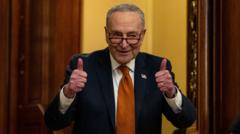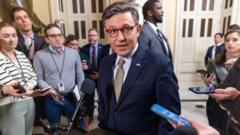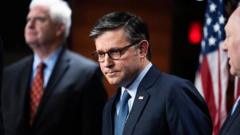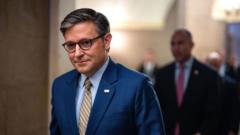Amid heightened tensions in Washington, President Biden is discussing the possibility of issuing pre-emptive pardons for those frequently criticized by Trump, including key figures like Dr. Anthony Fauci and Senator-elect Adam Schiff. This move could serve as a strategic defense against potential political retaliation.
Biden Administration Considers Pre-emptive Pardons Amid Political Tensions

Biden Administration Considers Pre-emptive Pardons Amid Political Tensions
President Joe Biden's team is reportedly exploring the issuance of pre-emptive pardons for individuals targeted by Donald Trump, signaling an escalation in political maneuvering.
In a notable political development, President Joe Biden and his senior advisors are reportedly deliberating a potentially groundbreaking strategy: the issuance of pre-emptive pardons aimed at individuals who have been prominently targeted by former President Donald Trump. This consideration arises amid Trump's recent expressions of intent to enact political revenge, prompting apprehension among Democrats and influential public figures alike. According to sources with knowledge of the discussions, the Biden administration's efforts are intended to provide protection against possible future retribution.
Although no definitive list has emerged, discussions have circulated around prominent names such as Senator-elect Adam Schiff (D-Calif.), Dr. Anthony Fauci, and former Representative Liz Cheney (R-Wyo.). These individuals have faced considerable backlash from Trump, with Schiff playing a significant role during the impeachment proceedings against Trump, Fauci enduring criticism for his management of the COVID-19 pandemic, and Cheney being targeted for her involvement in the January 6th Committee aftermath.
While pre-emptive pardons are not a common practice, legal experts cite historical cases where such actions have been taken to prevent potential legal disputes or unfounded charges that may arise for politically motivated reasons. Nonetheless, critics caution that providing pardons in advance could establish a controversial precedent, especially when no formal accusations have been leveled against those involved.
This exploration of pardons underscores the intensified political divides currently shaping Washington's landscape. With Trump continuing to wield significant influence over the Republican Party, the Biden administration appears committed to considering all potential measures to mitigate perceived threats against public officials and political figures.
As these discussions unfold behind closed doors, the prospects for whether this bold proposal will materialize within the Biden administration remain uncertain, further complicating an already intricate political scene. The prospect of preemptive pardons serves as yet another indication of the ongoing political chess match permeating American governance.



















